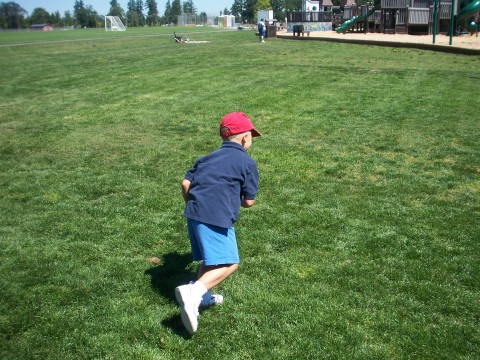As Kathy and I continue to try our hand at Parenting Tips, this week’s turn has fallen to me. Those of you who read my earlier pointer may see some overlap with today’s offering — indeed, the game we play to teach our children to come when we call is an outgrowth of this parenting principle.
A significant aspect of raising young children involves telling them to do things, or (perhaps even more often) telling them not to do things, as in one of our oft-used obscure movie quotes: “Stop doing things!” (Hint: Steve Martin has a starring role in this 1990 film.) Sometimes I can really identify with the frustration of the FBI agent in that story, thrust into a pseudo-parental role, responsible for a decidedly over-active ‘child’. In spite of the informational trickle-down among the children which a large family enjoys, sometimes it seems as though all I do is give instructions, and a lot of them seem to be the same kind of instructions I gave just a short time before.

As the ‘caboose’ child, Sarah sometimes doesn’t get the word on what is required.
One key principle Kathy and I embraced early in our parenting is the idea of first-time obedience. It is pretty simple — basically it means that when you give your child an instruction, they comply, fully and immediately. Surprisingly, many parents don’t hold their children to this standard, in spite of some of the obvious benefits.
Mom: “George, stop throwing rocks into the street.”
(George ignores his Mom, throws another rock.)
Mom: (at a higher volume) “George, I said, stop throwing rocks right now!”
George : (evaluates the situation and factors in the words ‘right now’; determines that some verbal response is called for, to avoid immediate punishment.) “I’m almost done!” he shouts over his shoulder.
Mom: “I’m counting to three. One … two … two-point-five … !”
George: “Aw, Mom, I’m having fun!”
Mom: (now slightly red in the face) “I’m serious. Three!”
George: “OK, OK.” (George heaves a deep sigh and throws one last rock into the street, narrowly missing a neighbor’s car, and makes a big show of trudging up the driveway.)
Mom: (smiling for the benefit of onlookers) “There’s a good boy.”
I first heard the parenting style illustrated above, described as ‘Threatening, repeating’. Gary and Anne-Marie Ezzo asked this revealing question of some of the couples they interviewed:
“What happens when you get to three?”
They were often told, “Oh, little George knows that when I get to three, he’ll really be in trouble.” They proudly continue, “He almost never disobeys after I get to three.”
Ezzo’s compelling rejoinder, “Why not move whatever consequence happens at ‘three’, forward, so that it happens at ‘one’?”
Many parents don’t realize that, by engaging in a series of threats and repeated instructions, they are actually training their children not to obey. It sounds crazy, but that is exactly what is accomplished. The child, after only a few iterations, quickly discovers that Mom and Dad aren’t serious until an instruction has been repeated three or four times. They push the limit, as do all self-willed people, and evolve a sophisticated system of evaluating how close they are to being punished, sometimes to the fifth or sixth decimal point. As children, they do occasionally misjudge the popping veins on their parent’s forehead, and encounter consequences … but on the whole, they are able to pursue their own will and avoid obedience to a large degree. Little surprise that some children grow up and encounter difficulties with employers and law enforcement personnel — they have been trained from early childhood not to obey authority, but rather to believe that they will always, even after repeated warnings, have a last-minute chance to comply without encountering any consequences.

No one said first time obedience couldn’t be joyful, or at least, they didn’t say it to Joshua.
I firmly believe that parents who do not require first-time obedience, are denying their child a significant blessing from God. By permitting (and even encouraging) rebellion through the establishment of such a low and unscriptural standard, the child is placed outside the ‘circle of protection’ that God erects for those who follow His commands for much of their childhood. More about that ‘circle of protection’ in another post, sometime.
Children, obey your parents in the Lord, for this is right. (Ephesians 6:1)
“Delayed obedience = disobedience” is one of the teaching formulae emphasized by the Ezzo’s in their Growing Kids God’s Way curriculum, and I’m inclined to agree with it. A child who hears a parent’s instruction and (assuming they are able) does not immediately comply, is a child who is in rebellion. No amount of parental prevarication will obscure this truth. Please note that this article is primarily aimed at parents of children in the early years (aged 18 months to five), and in the middle years (six to eleven); different phases of parenting require different strategies, as briefly discussed in The Effective Prayer of Righteous Men.
First time obedience means that when you tell your child to drop a rock or to stop yelling at their sister or to walk away from a steep incline, they do it. If it isn’t done within a few seconds, without argument or emotional backlash, then it isn’t first-time obedience.

Some instructions are more fun to obey than others, like when you are ordered to tickle your little brother.
Some parents have issues with anger, and shy away from authoritarian modes for fear that they will be negatively perceived by onlookers, friends and even spouses. This reaction is exactly backward. To illustrate this, answer this question: Which parent is more able to dispassionately and reasonably correct a disobedient child, the one who calmly gives a single instruction, or the one who has escalated through a half-dozen threats with increasing embarrassment, volume and blood pressure?
My children know that when I give them an instruction, I expect it to be obeyed immediately and completely. Those who fail to meet that standard are immediately corrected, sometimes by having to repeat whatever I told them to do several times in tedious repetition, or facing an immediate proportional consequence. I have found that by establishing a consistent standard of first-time obedience, I can avoid much of the conflict that other parents seem to experience. My children are characterized as well-behaved, gracious, cheerful and pleasant people to be around, largely because they are not in rebellion against my authority, which I hold in stewardship from God.
So why don’t more parents hold their children to this standard? I think there are several reasons; here are a few that occur to me:
- Ignorance – many parents have never seen first-time obedience modeled, and it hasn’t occurred to them that children are capable of meeting a much higher standard than is commonly seen on the playground or in the supermarkets.
- Laziness – some parents don’t take the time and effort required to establish a pattern of first-time obedience. In the first couple of weeks (before your children discover that you are not bluffing), it means getting up off the couch and correcting a child who didn’t obey. It means inconvenience and extra effort, usually when you are tired and inclined to overlook the misbehavior. The happy news for lazy parents is that, once established, the standard of first-time obedience does not actually require that much maintenance.
- Misguided Philosophy — this one is the hardest to address. Some parents actually think that it is inappropriate for them to exercise authority over their children. They believe that they should ‘reason with’ their toddlers as equals and avoid direct commands or instructions. Some over-react against extreme authoritarian models they saw as children, while others have simply abdicated their parental responsibilities. Sadly, parents who cling stubbornly to this parenting model will tend not to avail themselves of advice of this nature, in spite of evident positive results.
Reading an early draft of this post, Kathy tells me that it sounds a bit harsh. Additionally, I haven’t really done a very good job of communicating our passion for capturing our child’s heart for God, and the painstaking processes we employ in training and teaching our children. She is often a good judge of how people perceive me, so I’ll address that.
First, it is not my intention to denigrate others, rather to offer some hope and a path to more effective parenting. Secondly, I cannot over-emphasize the critical need for a parent to establish, through time and gentle teaching, a solid relationship with their child. Without a deeply-rooted foundation of love, first time obedience will merely produce outward conformity without touching the heart.

Sometimes a rebuke produces a contrite spirit, and sometimes it doesn’t.
From a practical standpoint, the establishment of a high and clearly-defined standard is kinder than having a vague and intermittently-enforced standard. Why should my child have to factor in my mood, the time of day, recent history and the relative humidity when calculating how quickly to obey me? Better to make it clear and simple, so they can focus their energy on the important fun of being a child. My relationship with my son or daughter (like my relationship with my boss or my wife) will operate more smoothly and without resentment when expectations are clearly communicated.

Just when you think you’ve got those tricky parents figured out, they surprise you …
First-time obedience is also a matter of trust — my children obey me quickly and completely because they can bank on my love and my willingness to lay down my life for them and for their good. I don’t order my kids around like robots, fulfilling my whims — rather I try to be sparing with my commands so my children can obey me knowing that I am asking them to do the right thing. I seek to instruct them, not out of selfish motives, but in submission to God and for the common good.
If you are characterized as a threatening-repeating parent, it will take some effort (mostly on your part) to change. You’ll want to sit down with your children and apologize for not being consistent in holding a scriptural standard of obedience. Upon reflection, you may also want to express to God a repentant heart, and ask Him for help in making a change in your family. Then clearly explain to your children that you will require first-time obedience (without argument or delay) for anything you tell them to do (or to stop doing). If you consistently correct anything that falls short of this standard, you’ll find that you have trained yourself (and, by extension, your offspring) within 3-6 weeks, depending on the age of your kids.
Although by the very nature of this post, I have set myself up as some kind of ‘parenting authority’, I strive for humilty, and I welcome any comment on this topic, especially if you feel I am in error. My desire is not to offend, but rather to offer help to other parents through a strategy that I believe to be godly, simple and effective.
Project 365, Day 232
Tim
Related posts:
![]()




















